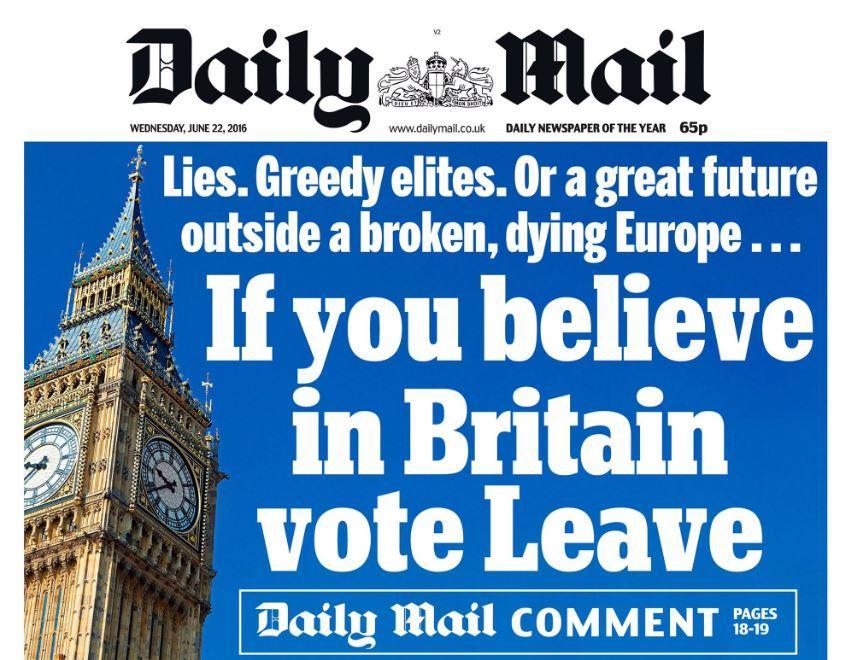As Daily Mail and Sun readers complain they were misinformed about Brexit, how do we respond?
Public disdain for expertise reached new heights during the campaign, and that in part must surely be a consequence of an anti-establishment, anti-elite culture fostered by the tabloid press


I have never been convinced by the argument that newspapers sway elections. For the most part, they take the position they believe their readers already prefer. Changes of allegiance generally occur when it is clear that the previously favoured side is a dead cert to lose – as was the case with the Tories when the Sun backed Tony Blair in 1997.
In the run-up to last week’s referendum, the mainstream, non-broadcast media was spilt in their views about which way to vote. The Sun, Daily Mail, Sunday Times, Express titles and Telegraph were in favour of Brexit. The Mail on Sunday, Times, Guardian, Observer, Independent and Evening Standard backed Remain.
Those on the Brexit side of the debate were more one-sided in their coverage, according to analysis by Press Gazette. And now that the deed is done, it is inevitably being asked whether readers of those newspapers were somehow duped into making a decision they might come to regret. Some users commenting on the Sun website and MailOnline appear to feel they weren’t given the full picture prior to polling day.
Some titles were certainly gung-ho in their support for Brexit. The Sun’s editorial on 13 June insisted that “we must set ourselves free from dictatorial Brussels” and concluded that the “apocalyptic” predictions of economic disaster by the Remain camp were “nonsense”. But on the other hand, the same paper at least gave column inches to reporting those predictions, including a double-page spread in which Chancellor George Osborne suggested that a Brexit vote would lead to severe cuts in military spending. And as the Sun’s property expert noted on 5 June, “political uncertainty that will follow [a vote to leave] will put the UK economy under pressure”. The warnings were there, it’s just they were met with reassuring words about perceived longer-term benefits – both from the pro-Brexit politicians and those in the media who supported their view.
It may be unbelievably rich for the Sun to suggest – as it seemed to be in its first editorial of this week – that current political uncertainty is the fault of the Prime Minister and other leading Remainers who have been “caught on the hop”. Like Boris Johnson, Michael Gove and the 52 per cent of voters who backed Brexit, the Sun et al must now take responsibility for whatever comes next. Even so, it seems too simplistic to blame the right-wing media for misleading the electorate per se. There is little suggestion that large numbers of voters shifted allegiance from Remain to Brexit on the basis of reassuring reports in newspapers.
That isn’t to let the media off the hook though. Public disdain for expertise reached new heights during the campaign, and that in part must surely be a consequence of an anti-establishment, anti-elite culture fostered by the tabloid press. For all that the Remain camp may have been better advised to run a more positive campaign, the manner in which their warnings were mocked was emblematic of the way in which politicians (and others regarded as “doing their bidding”) are now both derided and ignored. It is that, as much as any real disconnect between elected and electorate, which has led us to where we are now.

Worst of all, though, sections of the media did too little during the campaign to call out the sheer nastiness of anti-immigrant rhetoric employed by some of the more virulent Brexiteers. To implore the need for a reasoned debate about immigration is one thing, but when Ukip leader Nigel Farage unveiled his hideous “Breaking Point” poster, it must have been clear to any right-thinking person that hate had taken over. Many in the Brexit camp recognised it was beyond the pale, but there were no editorials from the Sun, Mail or Express condemning Ukip’s leader.
That failure goes to the heart of things. For even if we accept that there were – in theory – some intellectually sound reasons for wanting to leave the EU (concerns about its flabby bureaucracy or anxiety about shared sovereignty, for instance), it was as plain as plain could be that many of those voting to leave were motivated primarily by hatred – both of what they believed Britain had become, and of those they blamed for it. It was manifest in Farage’s poster, just as it was clear from some of the vicious responses to former Labour MP Jo Cox’s death on social media.
We have lived for a very long time under the illusion that Britain is immune to demagoguery. George Orwell once argued it was because we loved liberty so deeply, others have suggested we are too cynical. Yet of all the certainties the referendum undermined, perhaps the unmasking of that assumption is the most frightening. Brexiteers and Remainers may never agree on whether last week’s vote was a victory or failure for common sense. But in the political turmoil now unfolding, it is imperative that those on both sides seek to restore a sense of common decency which, at the moment, feels genuinely imperilled.
Join our commenting forum
Join thought-provoking conversations, follow other Independent readers and see their replies
Comments
Bookmark popover
Removed from bookmarks